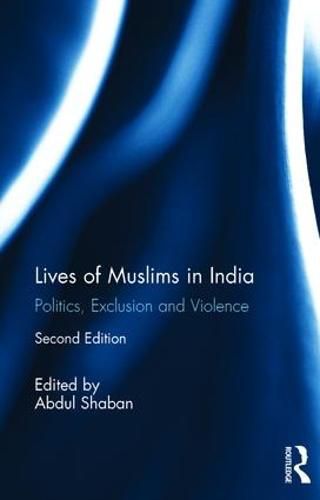Readings Newsletter
Become a Readings Member to make your shopping experience even easier.
Sign in or sign up for free!
You’re not far away from qualifying for FREE standard shipping within Australia
You’ve qualified for FREE standard shipping within Australia
The cart is loading…






The fast-consolidating identities along religious and ethnic lines in recent years have considerably ‘minoritised’ Muslims in India. The wide-ranging essays in this volume focus on the intensified exclusionary practices against Indian Muslims, highlighting how, amidst a politics of violence, confusing policy frameworks on caste and class lines, and institutionalised riot systems, the community has also suffered from the lack of leadership from within. At the same time, Indian Muslims have emerged as a ‘mass’ around which the politics of ‘vote bank’, ‘appeasement’, ‘foreigners’, ‘Pakistanis within the country’, and so on are innovated and played upon, making them further apprehensive about asserting their legitimate right to development. The important issues of the double marginalisation of Muslim women and attempts to reform the Muslim Personal Law by some civil society groups is also discussed. Contributed by academics, activists and journalists, the articles discuss issues of integration, exclusion and violence, and attempt to understand categories such as ‘identity’, ‘minority’, ‘multiculturalism’ and ‘nationalism’ with regard to and in the context of Indian Muslims.
This second edition, with a new introduction, will be of great interest to scholars and researchers in sociology, politics, history, cultural studies, minority studies, Islamic studies, policy studies and development studies, as well as policymakers, civil society activists and those in media and journalism.
$9.00 standard shipping within Australia
FREE standard shipping within Australia for orders over $100.00
Express & International shipping calculated at checkout
The fast-consolidating identities along religious and ethnic lines in recent years have considerably ‘minoritised’ Muslims in India. The wide-ranging essays in this volume focus on the intensified exclusionary practices against Indian Muslims, highlighting how, amidst a politics of violence, confusing policy frameworks on caste and class lines, and institutionalised riot systems, the community has also suffered from the lack of leadership from within. At the same time, Indian Muslims have emerged as a ‘mass’ around which the politics of ‘vote bank’, ‘appeasement’, ‘foreigners’, ‘Pakistanis within the country’, and so on are innovated and played upon, making them further apprehensive about asserting their legitimate right to development. The important issues of the double marginalisation of Muslim women and attempts to reform the Muslim Personal Law by some civil society groups is also discussed. Contributed by academics, activists and journalists, the articles discuss issues of integration, exclusion and violence, and attempt to understand categories such as ‘identity’, ‘minority’, ‘multiculturalism’ and ‘nationalism’ with regard to and in the context of Indian Muslims.
This second edition, with a new introduction, will be of great interest to scholars and researchers in sociology, politics, history, cultural studies, minority studies, Islamic studies, policy studies and development studies, as well as policymakers, civil society activists and those in media and journalism.